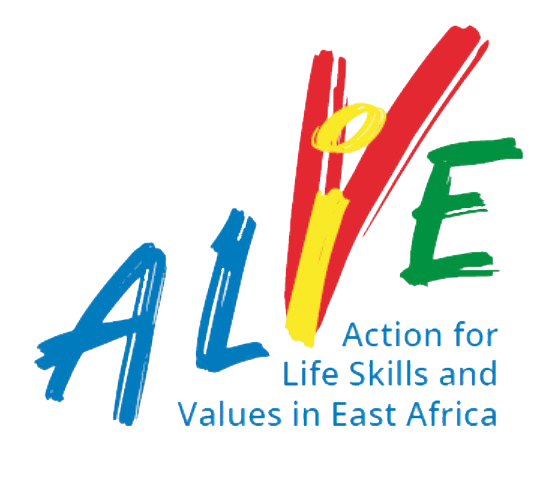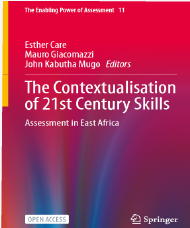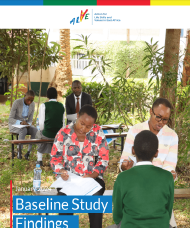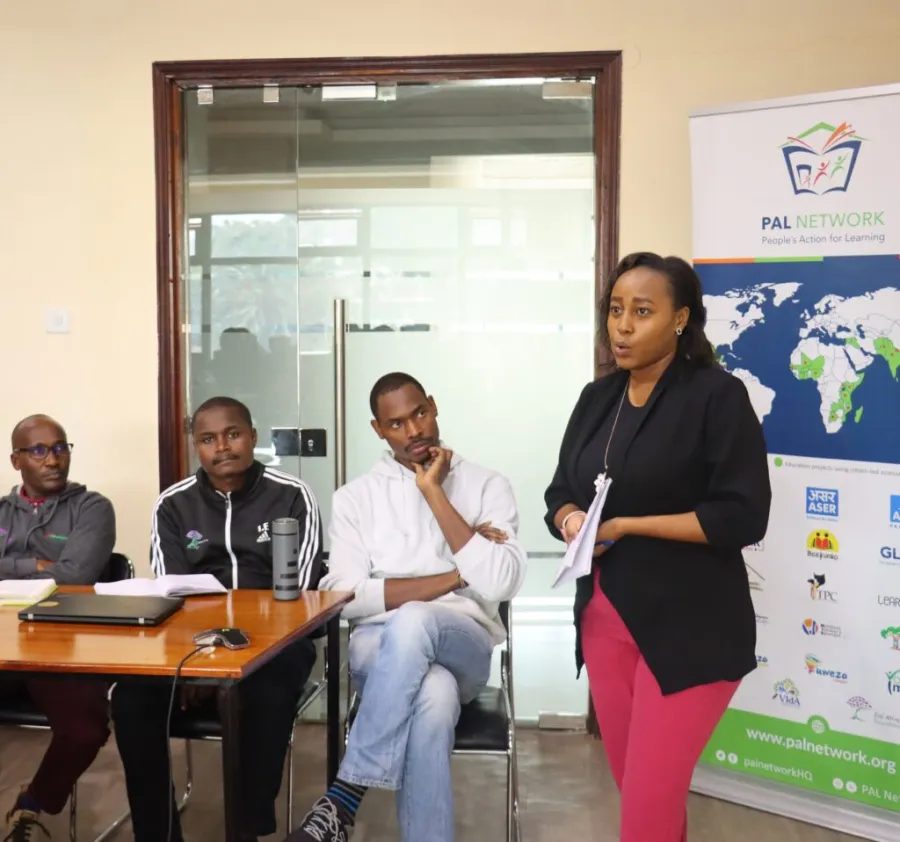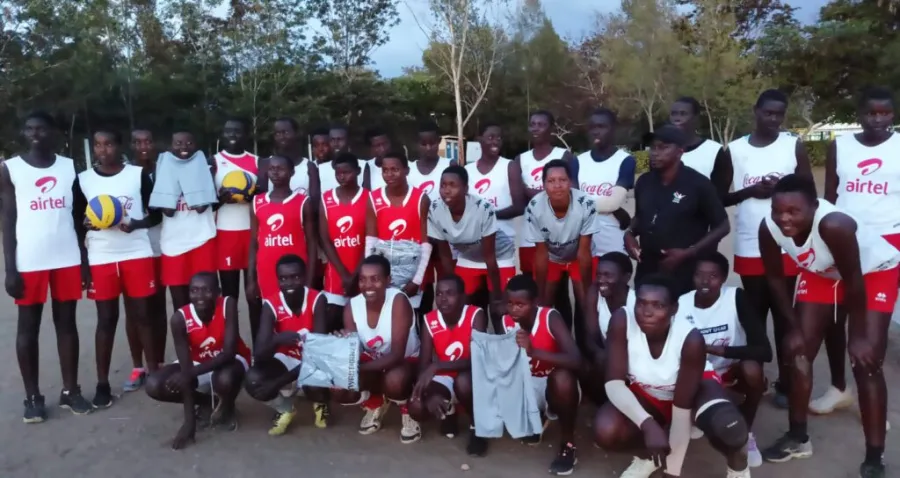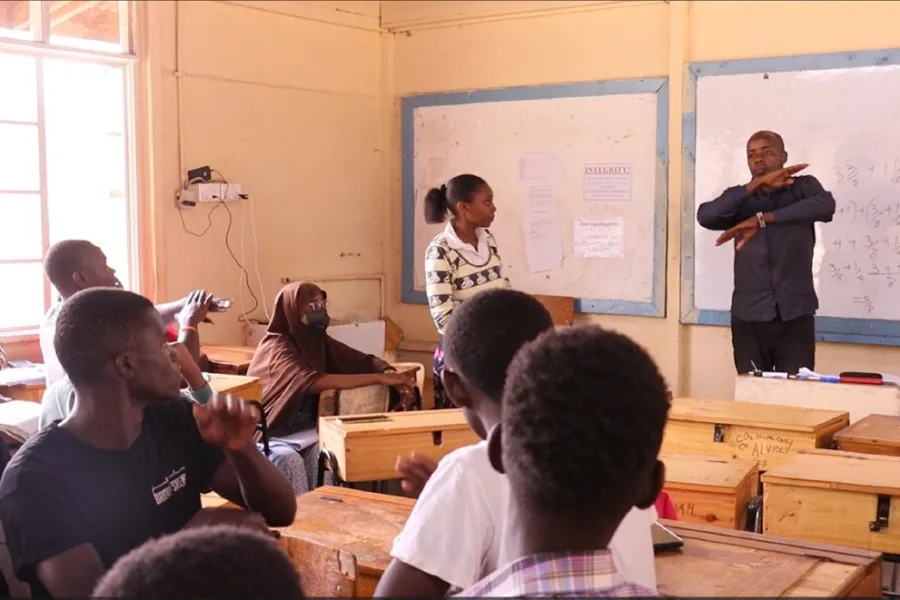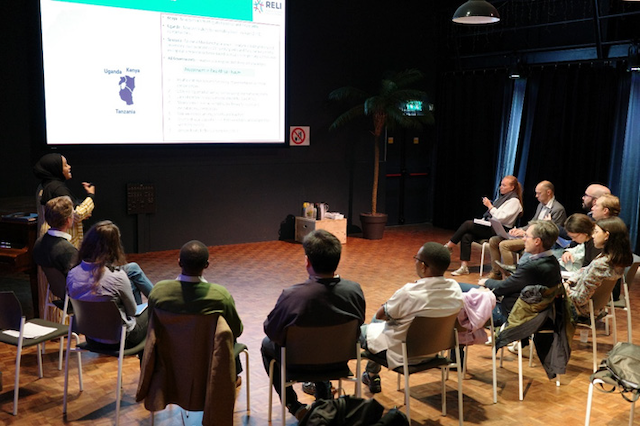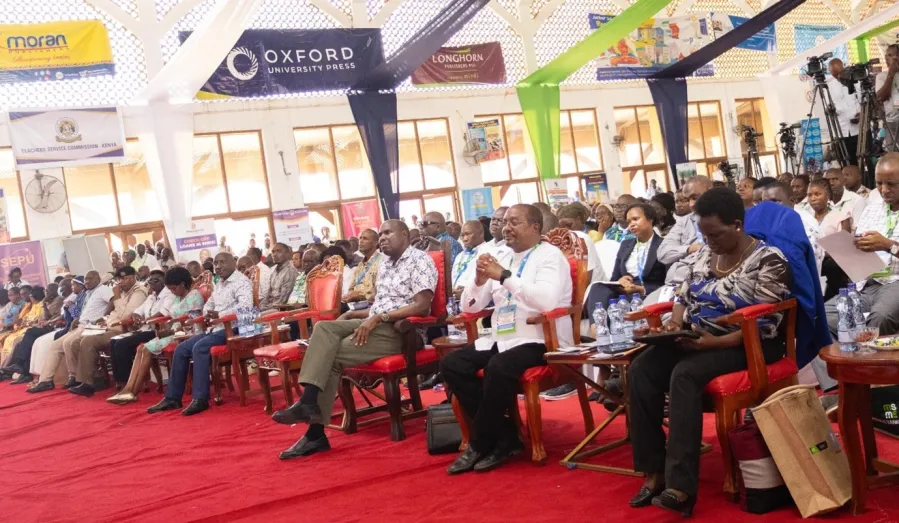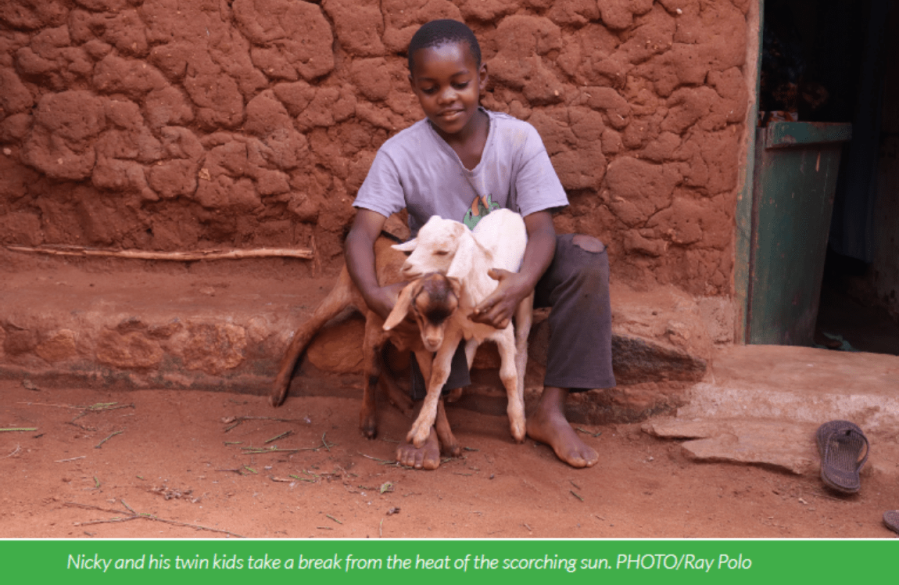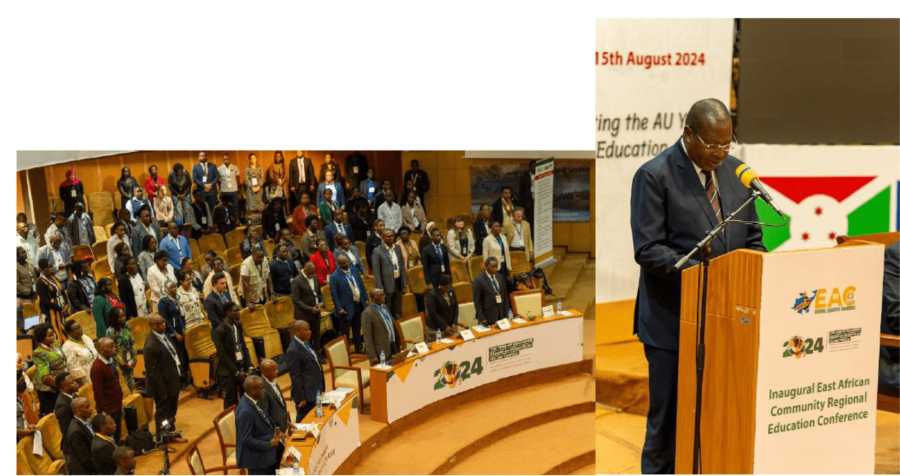Some of the adolescents, especially a few girls we assessed were a little shy, but when you interact with them further they get a little more comfortable and then open up. Ms Mwajuma Mbabazi, an Asesseor Report indicates that these competencies are not only needed in the workplace but are also crucial to support academic achievements and promote the holistic development of individuals and society.
By Stephen Macharia, PhD- Lecturer and Head of Strathmore Writing Centre School of Humanities and Social Sciences Ray Stata, an American management guru and investor, wrote, “The rate at which individuals and organisations learn may become the only sustainable competitive advantage, especially in knowledge-intensive industries.” Those words are as important to a modern-day organisation as they were in the 80s’ when they were written. Similarly, in the conclusion of an annual report, General Electric chairman wrote: “I finally recognised why we are so successful: it is because we are a learning organisation.” Coming from renowned managers of top corporates in the world, those statements are a pointer to the importance of organizational learning. In the current dynamic world of work where change and growth have been taking place at unprecedented levels, organizations must build a culture of learning. A progressive organization needs to position learning and continuous improvement of people and systems at the core of its focus. In line with that, the concept and practice of learning organisations is on the rise. Some organisations have developed booklets that have been useful in helping them craft superior products based on the lessons gathered from previous ones. Such organisations are becoming ‘workplace universities’ where learning and institutional knowledge are part of their routine practice. They gather, produce, analyse, retain, and transfer knowledge for the purpose of self and quality improvement. Learning organisations depend on data gathered from their day-to-day experiences with a view to boosting productivity and efficiency in their operations. They benefit from their past experiences and lessons from others. Besides growing leaders and employees who are well equipped to collect, analyse, manage, and transfer knowledge, such organisations also benefit from seamless succession management. Learning organisations are also able to develop systems that adapt to change in a rapidly evolving operating environment. They are often resilient and futuristic in their perspectives. Despite the benefits that organisations are likely to accrue from making deliberate efforts to learn, several bottlenecks have hindered this practice. The Harvard Business Review identifies three core barriers to creating learning organisations which include difficulties in implementing abstract recommendations; focusing learning on executives, excluding managers in charge of small departments where the actual work is done, and lack of standards and tools for collecting data to be analysed for creating knowledge for institutional learning. In a bid to respond to the need to develop values and life skills as invaluable competences in the East African school curriculum, the Regional Educational Learning Initiative (RELI) unveiled an initiative known as, Action for Life Skills and Values in East Africa (ALiVE). This initiative has, in its first phase, developed context-specific tools for assessing life skills in adolescents within the region. After developing context-relevant, open-sourced tools for assessing life skills in East Africa, ALiVE has now developed tools for organizational learning to bridge an existing gap. The tools have been informed by various models and frameworks that include the New World Kirkpatrick model, Brookfield self-directed learning, SMEDAN Learn shop criteria, Kolb, Gibbs, Schon and Experience, Reflection and Action among others. Through development of these tools, ALiVE aims at contributing to the practice and conversation on organizational learning and global discourse on knowledge generation from the global south. The developed tools have already been used by institutions involved in the ALiVE project in recent write shops, learn shops, and workshops. Government agencies, non-governmental organisations and private sector institutions can use those open-source tools to assess their capacity to learn and improve their practice through organizational learning.
By Ray Pollo, Senior Officer – Communications Before many can even pronounce their school’s name properly, girls at Kwanthanze Mixed Secondary School in Machakos County, in Kenya, have already perched their presence on the world map through sport. They are the towering African giants in the game of volleyball. They have lifted the Kenya national volleyball championship trophy as well as the East African cup multiple times. Their peers often see dust when they play. No wonder a local daily once tagged Kwanthanze, ‘a hotbed of volleyball talent in Kenya’ and it arguably seems to be, going by their streak and stay on top of the game. “National team coaches come to visit us because they know that Kwanthanze is the nursery of the Kenyan national volleyball team,” said Justin Kigwari, the team’s coach who also teaches at Kwanthanze. A young team which sprouted in 2010, only armed with passion and scanty training equipment, has risen through the years to become giants who have marked their territory on the volleyball pitch. “It was a simple start, starved of training kits and equipment. The girls have earned their space by sheer hard work, respect, and sustained team spirit. Their resilience has been amazing,” explained Kigwari. Kwanthanze’s bright star shone in 2013 and 2014 when, for the first time, they clinched both the national and east African cups in a row. Their dominance was, however, startled in 2015 and they had to settle for the second position in both national and regional games. In 2016, they did not see one mesh of a door to the national or regional tournaments. However, they intensified training, with fresh energy replacing girls who had graduated from the school to higher institutions of learning. “The loss helped us to evaluate our team and strategize until the girls rose up again to spike their way back to the top,” Kigwari noted. In 2017, Kwanthanze team regained their grip of the national cup and did not let it slip away until 2023, when Kesogon Girls from Trans Nzoia County whipped them out of the cup. Nonetheless, Kwanthanze girls went ahead to reclaim the regional title and are the reigning East African champions in the game. “I feel proud to be part of the winning team. Very proud. I am happy that our hard work has paid off,” Observed a smiley Fridah Boke who is the captain of Kwnathanze Girls Volleyball Team. On October 16, 2023, a team from Zizi Afrique Foundation visited the school to appreciate the secret to the girl’s winning ways. The visit was spearheaded by Action for Life Skills and Values in East Africa (ALiVE) program. We learned that through Kwanthanze volleyball team’s victories and losses, there is a common thread that interweaves resilience and teamwork. “The girls thrive in simplicity and humility. These alongside respect and responsibility, are the values we encourage, and we ensure they do not veer off their academic paths,” said Anthony Kitungi, the Principal at Kwanthanze Mixed Secondary School. “Sure,” says Coach Kigwari, “The backbone of any talent is discipline. We instil values of respect in the girls so that they do not neglect their academic work. After winning, we settle down and talk to them and let them know that there is more to life than just being volleyball champions. We make them aware of the destructiveness of being celebrities and feeling that they are on top of everything. We also challenge ourselves to cushion them so that they do not neglect their primary duty as students, the books! In short, we help them walk in the path of humility as talented students and players.” The girls cut their hair short as if it were part of their school uniform. They do not have sophisticated games gear, but every evening, they dare the dusty Ukambani grounds, to scale new heights in the tall game. Another skill which is hard to ignore is that of collaboration. The girls coordinate their game like a harmonious band spewing a classical rendition in the air. There is no one touch! The ball bounces creatively through three pairs of hands, as much as it is in the girls’ power to do so. Their pitch of communication and collaboration speaks maturity. They focus on the ball not on faults. When a team member flops, she is cheered up and when a win emerges, all celebrate and ready for the greater task ahead. We are curious to know whether these skills extend to the classroom. After a whole afternoon of playing and talking with the girls, staff members from Zizi Afrique Foundation honoured the team with new games kits and a token for lunch. They also engaged the girls on life skills and values that are useful both at school and beyond. The Foundation is keen on nurturing life skills and values and promoting sports as a motivation for wholesome development of learners. Meanwhile, hard work, teamwork and determination has earned Kwanthanze girls a ticket to Europe. In 2024 they will be heading to Serbia for the world championships. Kwanthaze principal promised that in the Serbia games, the girls will play in kits donated by Zizi Afrique Foundation as an honour to the organization and as icons of values from the heart of Africa. “Our prayer is to go and win for Africa at the world championship in Serbia,” Kigwari implored. We wish the team success as they prepare to showcase their talent to the world!
At Machakos Teachers Training College, learners from all walks of life are admitted regardless of their physical abilities. The College has embraced Kenyan Sign Language (KSL) in classrooms and other social spaces. In a learning environment where spoken language predominates, the incorporation of sign language interpretation in classrooms is boldly breaking communication barriers between learners and their educators, thus fostering a more equitable and inclusive learning experience. Students who are hearing impaired communicate with their hearing peers through signs. Even in their blended group discussions, they embody a rare sense of acceptance and collaboration. Inclusion has been a sad song that has not tickled many learners with disability, despite the progress made through decades of learning. However, the introduction of Kenyan Sign Language at basic education levels in Kenya may help change the tune. A danceable move may follow efforts made by both state and non-state actors to support learners and workers to learn and use Kenyan Sign Language. It is a welcome move at Machakos TTC where hearing students and staff learn KSL every so often and tap on signs from the hearing-impaired students as well. It is worthy recognition of who can learn which language to bridge the silent gap of communication that is often evident between hearing and deaf populations. Access to education in Kenya has historically been limited and the journey towards inclusivity has been rugged. Among the various strategies to foster an inclusive learning environment, sign language stands out as a powerful tool, particularly for students with hearing impairment. Through the Kenyan Sign Language, the students are not only able to communicate, but it also builds confidence among deaf students. It is the secret code to experiencing their otherwise silent world. A peek into the second-year Mathematics class at Machakos TTC gave us a new lens through which to look at inclusion. In every corner of the class and at the centre, students were communicating in signs to help sign outspoken statements from their peers. When it came to demonstrating their understanding of the mixed fraction lesson, time and chance happened to all. First, it was Rose Nafula’s turn to show how best she would take a learner through a mixed fraction sum. She speaks and engages the rest of the class as Alice Wambui the assigned KSL interpreter signs along. When Nafula is done, Beston Kiprotich takes the stage. He is a signer. He takes on the sum while Wambui helps to voice his signs to the rest of the class. What a sight to behold! A world of signs and sounds toward a common answer. The integration of Kenyan sign language and interpreters into Kenyan classrooms is a laudable step towards a more inclusive educational system. In a classroom where communication is accessible to all, students no longer feel isolated due to their hearing impairment. They can actively participate in discussions, contribute their ideas, and equally engage in class activities. In turn, this makes the classroom environment more equitable for everyone. Moreover, the act of learning sign language and interacting with interpreters promotes broader societal inclusion. It challenges the assumption that spoken language is the only way to communicate and encourages a culture of inclusivity. Machakos TTC is one of the institutions that collaborate with Zizi Afrique Foundation (ZAF) to champion core competencies, also known as life skills and values. Other than supporting teacher educators at the college to define, integrate, nurture and assess the core competencies, Zizi Afrique Foundation has influenced the formation and strengthening of clubs to enhance the implementation of competency-based education. One such club is the Peace Club, where students have a platform to freely express themselves while respecting each other’s opinions and diverse backgrounds. Other efforts include talking walls, boards and seats, that constantly remind the school community about the desired values and life skills. The college has gone further to introduce the said values and life skills during students’ orientation. They practice the same as they go about their businesses within and without the college. If there was any challenge I got from our trip to Machakos Teachers Training College, it is the challenge to learn and communicate in Kenyan Sign Language! Erika Mungai Article by Erika Mungai
Amidst ongoing global concerns regarding the direction and implementation of education, East Africa is experiencing an educational transformation, with curriculum reforms at the forefront of this shift. The shift to competency-based education (CBE) has sparked a growing emphasis on nurturing life skills and values to educate learners fit for the 21st century. However, a lasting impact may become elusive if educators lack the skills to effectively teach, assess, and foster these competencies throughout the school system. The transition requires teachers to adapt to CBE with new teaching strategies and a deeper understanding of how to foster competencies such as critical thinking, creativity, and problem-solving, among others, in their learners. The technical capacities to teach, assess, and nurture these competencies remain a real challenge in many classrooms, leading to disparities in how the competency-based curriculum (CBC) is delivered across schools. The risk is that the CBC could exacerbate existing inequalities instead of bridging gaps. With limited evidence on what works in nurturing life skills and values, there is no better time than now for researchers and academics, to collaborate in exploring promising approaches to nurturing life skills and values through rigorous and robust studies. The potential impact of this research is significant, as it will generate the evidence necessary to inform and support the implementation of CBC. Evidence on the specific needs of teachers, students, and school systems is essential for targeted school interventions, tailored professional development for teachers, and curated learning materials that ensure all schools, regardless of location, can deliver the CBC effectively. The Action for Life Skills and Values in East Africa (ALiVE) initiative, in partnership with Kenyatta University (Kenya) and the University of Utrecht (Netherlands), has since May 2024 been exploring collaborative research opportunities that seek to bring together leading universities in the East Africa region with universities in the global north for a North-South research agenda, aimed at delivering what works in nurturing life skills and values. Regional organizations have since joined the collaborative. They include United Nations Children’s Fund (UNICEF), Aflatoun International, Network of Impact Evaluation Research Africa (NIERA), and Education Sub-Saharan Africa (ESSA), alongside regional higher institutions of learning like Strathmore University and the University of Dar-es-Salaam. Others like Kyambogo University, Makerere University, and State University of Zanzibar have also shown interest. The first co-creation meeting organized and hosted by Kenyatta University occurred on September 23rd – 24th 2024. Different government entities, including curriculum institutes, teacher service commissions, assessment agencies, and teacher educators, participated in the workshop to co-create a research agenda, focusing on exploring promising nurturing approaches that teachers (and parents, to some extent) use to develop values and life skills. During the workshop, participants co-developed a strategy for a randomized controlled trial (RCT) to identify the most effective methods for nurturing life skills and values. The participation of key government stakeholders, including representatives from the Kenya Institute of Curriculum Development (KICD) and the Teachers Service Commission (TSC), contributed valuable insights to ensure practical application and policy alignment. A central theme of the workshop was the need to strengthen locally led research, remarkably increasing the involvement of women and early-career African researchers. By fostering collaboration and promoting African-driven solutions, the workshop laid a foundation for meaningful improvements in teacher education and the overall implementation of CBC in classrooms across East Africa. Find out more about our work on www.alive-reli.org
More than 15,000 delegates are gathered in Mombasa for the annual Kenya Primary School Headteachers Association (KEPSHA) conference 2024. This year’s theme is “Transformative Leadership in the Digital Transition, for Inclusive and Sustainable Quality Basic Education in Kenya.” The conference, which also doubles as the KEPSHA Annual General Meeting, was officially opened on Tuesday by the Chief of Staff and Head of Public Service in Kenya, Mr. Felix Koskei. Mr. Koskei underscored the value of digital technology in improving learning and advancing school leadership and management while also emphasizing the need for collective responsibility in ensuring that the digital transition does not erode learners’ values. Global digital transformation has redefined how we learn, how we teach and how we lead. We urge all teachers to make digital literacy an integral part of every learner’s journey, equipping them with the skills to become suitable digital citizens and innovators of the future. Mr. Felix Koskei, Chief of Staff and Head of Public Service in Kenya The Principal Secretary for Basic Education Dr. Belio Kipsang appreciated teachers for stabilizing the implementation of competency-based curriculum (CBC). He also lauded the milestones in integrating digital technology into the Kenyan Education system. Technology is the way to go because it supports both delivery and assessment of our curriculum. The assessments in teacher training colleges will all go digital both in administration and marking. We look forward to leveraging technology in similar ways in our schools too. I thank you teachers for taking charge of the 2024 Kenya Primary School Education Assessment (KPSEA), which concluded without challenges. I am happy that we did not need police officers to man assessment centers with guns as had been the case before. This is a huge relief because assessment should be done in a cheerful and relaxed atmosphere. Dr. Belio Kipsang, Principal Secretary for Basic Education The leaders reiterated the need for deliberate integration of values and life skills in education, to help develop a whole learner who will be ready for opportunities and challenges of the 21st Century. Primary school education is not merely a phase, it is a critical level where we embed essential values, cultivate skills and instill competencies upon which students rely for their journeys in life. We appreciate that education is a sum of intelligence and character. Allow me to share wisdom from an old man who taught me never to hire for competencies alone but to always hire for character. This is because, you can train people to acquire skills, but you cannot teach them to become who they are not – in character. Mr. Felix Koskei, Chief of Staff and Head of Public Service in Kenya On his side, the KEPSHA National Chairman Mr. Johnson Nzioka urged headteachers to embrace technology as a vehicle to effectively navigate the complexities of modern leadership. He called on the government to employ more teachers who would share in the growing workload of the progressing competency-based curriculum. Mr. Nzioka spoke as he presided over KEPSHA rebranding. We are not just gathered to celebrate our achievements but also to launch a new chapter in our story, a chapter defined by a revitalized identity, renewed commitment and a bold vision for the future of primary and junior school leadership in Kenya. We can only look into the future with purpose, passion and professionalism. A future where every child in Kenya can access quality education and where every school headteacher is empowered to lead with excellence. Mr. Johnson Nzioka, KEPSHA National Chairman Click here to watch the opening ceremony Technology for School Leadership: Phone, Data, Evidence and Decisions The Executive Director of Zizi Afrique Foundation, Dr. John Mugo noted the organization’s digital journey and the power of technology as a tool for transformative change. His presentation shared existing innovations that have worked to ease the implementation of CBC, both within and without Zizi Afrique Foundation. “We have adopted a lot of technology at Zizi Afrique Foundation. Our digital dashboards, for example, allow us instant access to information on our programs just at the click of a button. When I want to track our progress, I don’t need to do many emails and give colleagues time to respond. I just click it and get it right where I am.” Dr. Mugo praised the power of technology in expanding access to educational information and interaction across communities. Today, we no longer think of education and child labour as ‘either/or’. Through technology, the young people herding animals in Mandera, and the married girls in Samburu, can have education without abandoning their culture. We must make learning possible for them. We must use technology to enhance the learning experience. Previously, teachers spent a quarter of the lesson time drawing on and rubbing the chalkboard. Today, simple concepts in science or math can be illustrated using videos and virtual reality. This is the way to improve learning outcomes, especially for those facing learning difficulty and with special needs. Dr. John Mugo, , Executive Director of Zizi Afrique Foundation and Principal Investigator of ALiVE During the conference, Zizi Afrique Foundation and Regional Education Learning Initiative (RELI-Africa) teams conducted a random survey of teachers, seeking answers to this question: What data do you require to make decisions in the running of your school? Zizi Afrique Foundation thrives in continued partnership with the Ministry of education, teachers, parents, and other education stakeholders. The organization is a long-time partner of KEPSHA and is one of the sponsors of the KESPHA conference 2024. We do not work to create parallel solutions to government. We have adopted systems change, supporting the public education system to improve so that it works for all children. We thank all the headteachers who have opened their school gates for us from time to time, whenever we get permission from the Ministry, in all the counties where we work. Together, we will improve learning for the children in Kenya. Dr. John Mugo, , Executive Director of Zizi Afrique Foundation and Principal Investigator of ALiVE Zizi Afrique Foundation has led many tech-based initiatives even during the Covid-19 pandemic, to foster household
On the hills of Kulele, there is a goat charmer! He is barely twelve, yet he tends twin kids like a pro. They love him. They like him. If you want to be the goat, you have got to climb the mountain, the saying goes. Therefore, we climbed to the peak of Kulele, trudging through remote thorny gullies, with vigilant nerves. On our way a goat grazing in the open field gets startled by our creepy moves. It sneezes out an alarm and starts to jump in a wild escape move. It ends up trapped in its rope. Dangerous! My instincts force me to touch an entire goat for the first time in my life. The desperate bleater is self-trapped but keeps yelling and rolling from side to side. My fellow assessors have gone down another treacherous gorge, so I must handle this goat with my raw hands. Meanwhile some wild childhood scenes of a bully buck charging to butt on an opponent, replay in my head. You, know, the type of a billy goat that lifts its front legs like a wrestler before attacking. Yes, that scene! But this poor goat needs help. A simple strategy of scaring the goat round a twig helps to unwrap it from the tight rope. The goat is free at last and so am I to face the next trek. Kulele beckons! I was not aware that Kulele hosts a young goat keeper, whose skills would have saved my mediocre goat rescue moves. Nicholas Mwandoe and his family have always known the hills as their home. They call him Nicky. He has picked cues on how to tend livestock, from his elders. With rare charm he plugs two baby goats in his embrace, as though they were the lastborn in the family. The brown and white duo dot every move Nicky makes in the shrub-perched parcels of land in Kulele. He has become a goat magnet; blades of grass are his sparky magic. The teen has found friendship in his twin little siblings, well, kids. When schools close, Nicky brushes the bushes of Kulele to bring back a green treat. The kids are so fond of his hand-to-mouth feeding that they play lazy at grazing. Nicky knows that the way to their heart is through their ruminating chambers. And the duo dances to the green music whenever Nicky plays it right. His hands take the place of a choir master’s button, with the goats following back and forth as if to hit a high note on a piano. They are good at snacking. “These goats keep climbing on me and sniffing me for grass, because I give it to them every so often. They are used to the treat,” Nicky explains. “These goats keep climbing on me and sniffing me for grass, because I bring for them grass every so often. They are used to the treat,” Nicky explains. When there is no green grass in his hand, they stare at him as though to remind him that it is munch time. He gets the cue and dashes out for a timely treat. The goats don’t wait for him to serve them, they jump on him, poking his torn trousers which are hungry for a perch on the knees. They know he has goodies, and he yields to their playful pressure, until the mother goat returns from the fields. Although Nicky did not fall in the bracket of respondents in the just concluded assessment, he is no doubt a case study who may benefit from the 6–12-year-old assessment tool that ALiVE piloted in February 2024 across three counties in Kenya (Nairobi, Kiambu and Kirinyaga). ALiVE co-created the tool with teachers in Kenya, with the understanding that teachers are the custodians of the curriculum and are better placed to not only integrate but also nurture and assess the life skills and values at classroom level. ALiVE is also working with teacher training colleges to ensure that teacher education curriculum incorporates life skills and values . ALiVE is also working with teacher training colleges to ensure that teacher education curriculum incorporates life skills and values Back to Nicky’s goat world, the kids’ silly smear and random hugs are entertaining. As a climax, one of the goats goes round to Nicky’s back and rubs on him with a ton of a tickle. He laughs off this naughty move, mumbling a “leave me alone.” You should see how they make a goat convoy behind him to the water trough. It is a circus scene to behold! I had never seen such social bleaters! So, I learn that goats are not that stupid after all. They can be friendly creatures capable of lobbying for their needs. They can really stare at and connect with humans almost like dogs do. However, that may depend on the care and attention humans give in reciprocation. In Nicky’s case, the kids hug him and almost ‘talk’ to him in sweet bleats. Under the scorching sun, they scramble for Nicky’s lap, where they snooze away some silent siesta. He is an ardent nurturer. His hand, a feeder, his lap a pillow! To the kids he is the Greatest of All Time, he is Nicky the G.O.A.T! By Ray Pollo, Senior Officer – Communications
Repurposing Education for the 21st Century through Human Capital Investment: What Are the Odds of a Skills-First Approach for East Africa’s Youth? If you think education is expensive, try ignorance! It will be even more costly for us not to pursue these reforms. This phrase from the recent Inaugural EAC Conference celebrating the AU Year of Education, held from August 12-15, 2024, in Arusha, Tanzania caught me off guard and hit hard. It’s a glaring truth we face every day: ignorance is costly—very costly. But what do we do about it? What is our stance on it? What small, incremental efforts are we making to learn something new that benefits us? How committed are we to this? How enthusiastic and curious are we, or have we lost the morale for learning and become indifferent? What about the children and youth being denied this opportunity? Those without the privilege that we often take for granted. East Africa, a region rich in flora and fauna, with a current population of approximately 502,744,092 and a population density of 75 people per square kilometre (194 people per square mile), stands at a pivotal crossroads. Spanning a total land area of 6,667,493 square kilometres (2,574,332 square miles), the region is home to one of the youngest populations in the world. As the population continues to rise over the next decade while land size remains constant, what opportunities are we missing? This youthful demographic holds immense potential to drive economic growth, innovation, and social progress, but to fully realize this potential, significant investment in education is crucial. This was emphasized by His Excellency, the Vice-President of the United Republic of Tanzania, Dr. Philip Isdor Mpango, accompanied by Hon. Prof. Adolf Mkenda, Minister of Education, United Republic of Tanzania, Her Excellency Veronica Nduva, Secretary General of the East African Community, His Excellency Prof. Mohammed Belhocine, Commissioner for Education, Science, Technology and Innovation at the African Union, and other dignitaries from the eight member states of the East African Community: Burundi, Democratic Republic of the Congo (DRC), Kenya, Rwanda, South Sudan, Somalia, Tanzania, and Uganda. “East Africa, just like the rest of Africa, has a very youthful population with the highest fertility rate in the world! This population structure and dynamics can be a huge blessing. It means that we will continue to have a young and dynamic population to build our economies. If we harness our human capital fully, we will enjoy the fruits of our youthful population through what is called the Demographic Dividend,” He further emphasized the economic returns of education, citing World Bank estimates that suggest Africa has the highest return on education globally, with each additional year of schooling increasing average youth earnings by up to 14%. The World Bank (2018) highlights that investing in people—through their health and education—is essential for a country’s success. When nations focus on improving the well-being of their citizens, they’re not just making life better for individuals; they’re also setting the stage for stronger economic growth and a brighter future. In fact, the differences in income levels between countries can often be traced back to how much they invest in their people. As the world becomes more connected and technology-driven, helping people develop their skills and potential will be even more critical for countries to thrive. If you think education is expensive, try ignorance! It will be even more costly for us not to pursue these reforms- Dr. Philip Isdor Mpango, Vice-President of the United Republic of Tanzania Despite the region’s potential, the Vice President acknowledged the challenges of underfunded education systems, as shown by low Human Capital Index scores in EAC member states, which fall below the Sub-Saharan Africa average. He emphasized the need for a renewed focus on education, highlighting Tanzania’s efforts to reform its education system, including plans to extend compulsory schooling to ten years by 2027/28 and to integrate vocational training into the secondary curriculum. A skills-first approach, emphasizing 21st-century competencies, prepares youth for success in a complex, tech-driven job market by focusing on the skills needed for emerging roles rather than traditional degrees. This approach broadens access to meaningful jobs, ensuring If you think education is expensive, try ignorance! It will be even more costly for us not to pursue these reforms- the Vice-President of the United Republic of Tanzania, Dr. Philip Isdor Mpango young people have the critical skills to drive economic growth and national competitiveness, securing future prosperity (World Economic Forum, 2023). A 2023 regional summary report by Action for Live and Values in East Africa (ALiVE), a Regional Education Learning Initiative (RELI) Africa collaborative, shows that a significant proportion of adolescents in the region struggle with essential life skills such as problem-solving, self-awareness, and collaboration. About 33% of adolescents have difficulty recognizing problems and identifying solutions, while 37% show limited insight into how their emotions influence their behavior.These findings underscore the urgent need to strengthen educational curricula to better develop these critical skills, ensuring that youth are equipped not only for academic success but also for the complex social and emotional challenges they will face in the workforce and society at large. Meaningful education is our collective responsibility: parents, educators, policymakers… I will close with reflections inspired by one of the keynote speakers at the conference: How can our learners be helped without leaving anyone behind? How can education systems be supported to advance holistic development? How can we support teachers in delivering the Competency-Based Curriculum? And how can we better coordinate our regional efforts in education to minimize duplication and maximize impact?” Let us arise from our slumber of ignorance and uphold the treasure of authentic education. Ignorance costs us greatly—impacting our well-being in general. As Nelson Mandela wisely said, “Education is the most powerful weapon you can use to change the world.” By Teddy Mutoni, Program Assistant-Learning Hub
